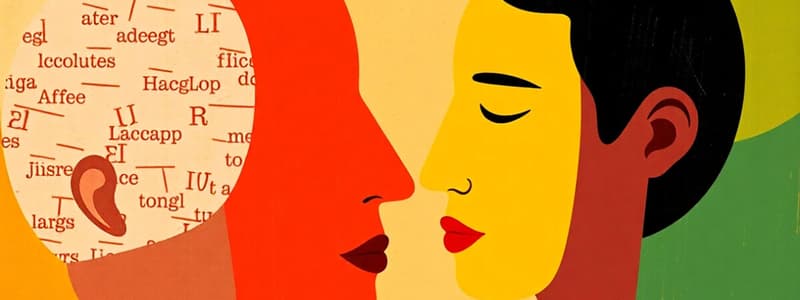Podcast
Questions and Answers
What role do dialect boundaries play in the study of dialectology?
What role do dialect boundaries play in the study of dialectology?
- They serve as a visual representation of language density.
- They indicate the geographical distribution of formal language use.
- They help improve the understanding of linguistic change. (correct)
- They show the historical origin of a language.
Which of the following best describes the focus of dialectology?
Which of the following best describes the focus of dialectology?
- The innovation and diffusion of language changes. (correct)
- The grammatical structure of regional languages.
- The evaluation of historical texts for language evolution.
- The phonetic differences between formal and informal speech.
In dialectology, what is primarily studied to understand linguistic change?
In dialectology, what is primarily studied to understand linguistic change?
- The geographical distribution of dialect boundaries. (correct)
- The influence of social media on language evolution.
- The impact of historical literature on modern dialects.
- Variations in syntactical structures across different dialects.
What does dialectology predict regarding linguistic innovations?
What does dialectology predict regarding linguistic innovations?
How does Dialectology contribute to Historical Linguistics?
How does Dialectology contribute to Historical Linguistics?
What is a defining characteristic of language variation?
What is a defining characteristic of language variation?
What differentiates a dialect from a language variety?
What differentiates a dialect from a language variety?
Which of the following statements about dialects is true?
Which of the following statements about dialects is true?
Language attitudes towards dialects are often influenced by what?
Language attitudes towards dialects are often influenced by what?
In the context of language, what does 'mutually intelligible' refer to?
In the context of language, what does 'mutually intelligible' refer to?
Which of the following is an example of a sub-dialect within American English?
Which of the following is an example of a sub-dialect within American English?
What type of dialect is typically preserved by speakers from rural areas with lower educational levels?
What type of dialect is typically preserved by speakers from rural areas with lower educational levels?
Which term refers to the systematic study of regional dialects?
Which term refers to the systematic study of regional dialects?
How does accent primarily function in language?
How does accent primarily function in language?
Which of the following is NOT true about the General British accent?
Which of the following is NOT true about the General British accent?
What role does sociolinguistics play in relation to dialectology?
What role does sociolinguistics play in relation to dialectology?
What does dialectology produce to represent the distribution of dialects and accent features?
What does dialectology produce to represent the distribution of dialects and accent features?
In the context of English dialects, what does 'basilect' refer to?
In the context of English dialects, what does 'basilect' refer to?
Which of the following best describes the relationship between accent and dialect?
Which of the following best describes the relationship between accent and dialect?
Which of the following identifies an accent as independent of dialect prestige?
Which of the following identifies an accent as independent of dialect prestige?
Flashcards
Language Variation
Language Variation
A fundamental and inherent quality of language; present at all levels (sounds, words, grammar, etc.). It allows for the identification of individuals and groups, and the study of language history and comparison.
Language Variety
Language Variety
One of several variations of a language. These variations are mutually intelligible and can be geographically specific (e.g., American English).
Dialect
Dialect
A geographical variation of a language. All dialects are valid variations, varying in pronunciation, vocabulary, and grammar. They are associated with a particular area or region.
Sociolect
Sociolect
Signup and view all the flashcards
Standard dialect
Standard dialect
Signup and view all the flashcards
Non-standard dialect
Non-standard dialect
Signup and view all the flashcards
Mutual intelligibility
Mutual intelligibility
Signup and view all the flashcards
What does dialectology do?
What does dialectology do?
Signup and view all the flashcards
What are the main concepts in Trudgill's 'Dialects'?
What are the main concepts in Trudgill's 'Dialects'?
Signup and view all the flashcards
What are the units of study in 'Dialects'?
What are the units of study in 'Dialects'?
Signup and view all the flashcards
Methods in Dialectology
Methods in Dialectology
Signup and view all the flashcards
What is a dialect map?
What is a dialect map?
Signup and view all the flashcards
Ethnolect
Ethnolect
Signup and view all the flashcards
Genderlect
Genderlect
Signup and view all the flashcards
Basilect
Basilect
Signup and view all the flashcards
Mesolect
Mesolect
Signup and view all the flashcards
Accent
Accent
Signup and view all the flashcards
Dialectology
Dialectology
Signup and view all the flashcards
Traditional Dialect
Traditional Dialect
Signup and view all the flashcards
Study Notes
Introduction to Dialectology
- Course title: Suprasegmental Phonology of English and Dialectology II 2024
- Topics covered: Language Variation, Language Varieties, Dialect, Accent, Dialectology, Assignment
Language Variation
- Variability is a fundamental and inherent property of language
- Language variation is present in producing sounds, processing linguistic signals (e.g. pitch, sounds, lexis, syntax, rhythm, fluency, style)
- Variability helps to identify individuals, groups, countries etc
- This also helps to understand the history and compare languages
Language Varieties
- Language varieties are mutually intelligible variations of a language
- Examples : Danish-Norwegian, Mandarin Chinese - Cantonese Chinese, American English, Australian English etc.
- Language varieties are geographically specific and are called dialects
Dialect
- Dialects are geographical variations of a language
- All dialects are equally valid and different from Standard Dialect
- Language attitudes towards specific dialects can be influenced by extralinguistic factors like social judgment or discrimination
- Variation in dialect can be linked to social class, age, gender, occupation, educational level. Called Sociolects
- Dialects have different syntactic and lexical systems compared to other dialects of the same language
- Sociolects are dialects that are distinguished by social class, education, gender etc
Accent
- Accent is a collection of segmental and suprasegmental characteristics that distinguish one accent from another in a language
- Accent is used to distinguish a speaker's regional origin and social status
- Accent is independent of the dialect's prestige , meaning both prestigious and non-prestigious dialects have an accent.
- Accent identifies whether a person is a native speaker of a language
Dialectology
- Dialectology is the systematic study of regional dialects. It emerged in the second half of the 19th century and is closely associated with historical linguistics, specifically regarding linguistic changes.
- Dialectology is related to sociolinguistics
- Sociolinguistics emerged in the mid-20th century and explores the impact of social factors on language usage.
- Dialectology helps record data about disappearing dialects , maps dialect distribution and describes and compares different dialects of a language.
- Dialectology helps to improve our understanding of linguistic change, explains linguistic phenomena such as innovation and diffusion and predicts how innovations or changes will spread
Assignment
- Students will make a list of the main concepts discussed and illustrate with examples.
- Students should discuss their list in class (next Tuesday/Thursday)
Studying That Suits You
Use AI to generate personalized quizzes and flashcards to suit your learning preferences.




